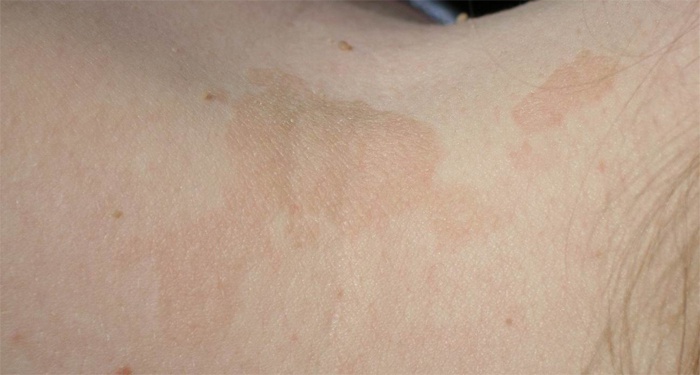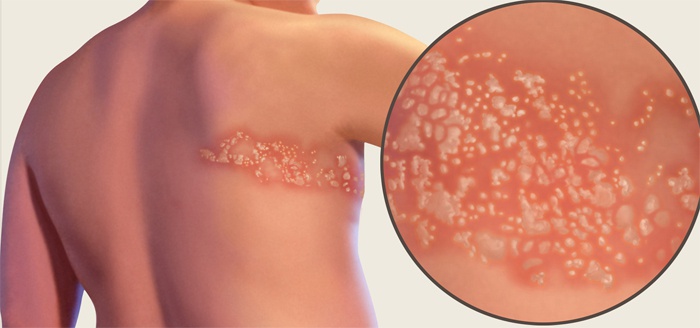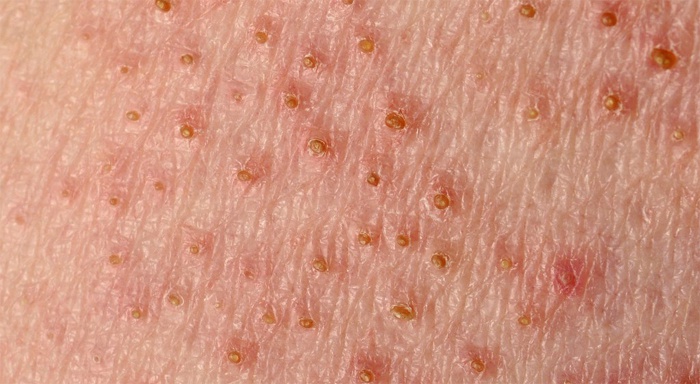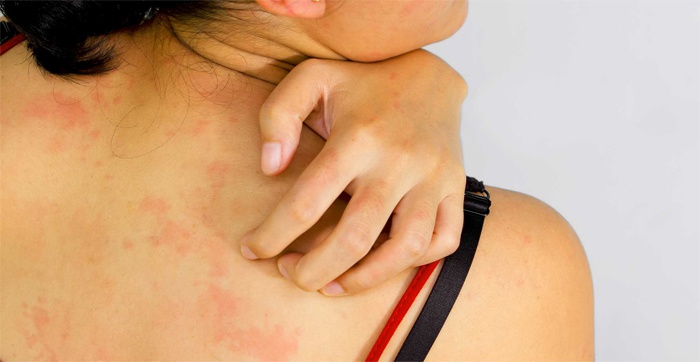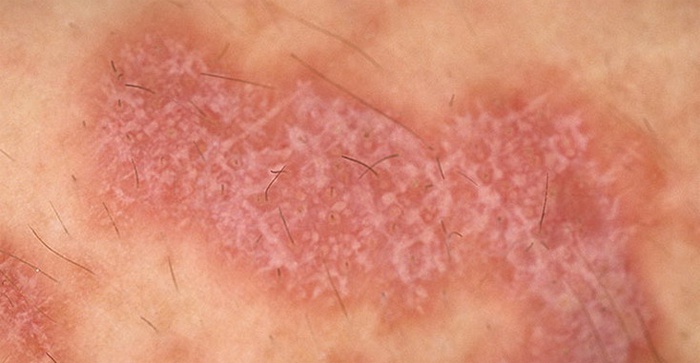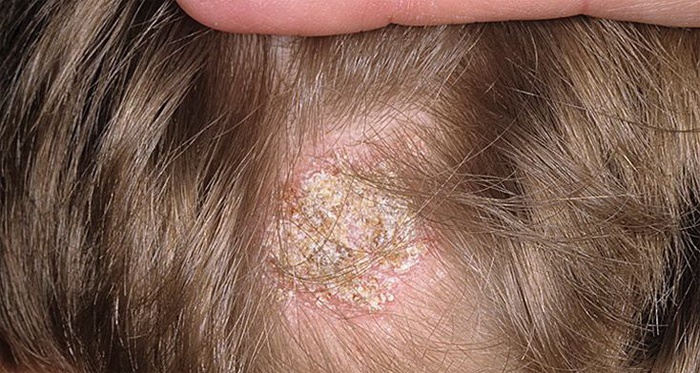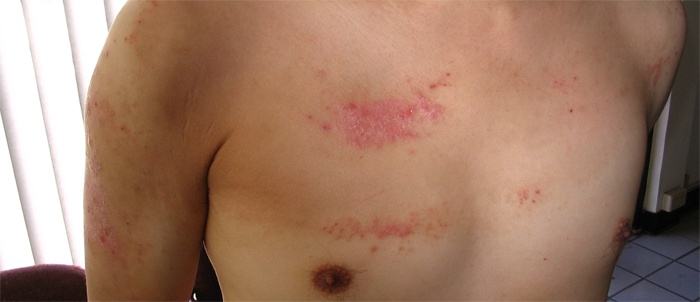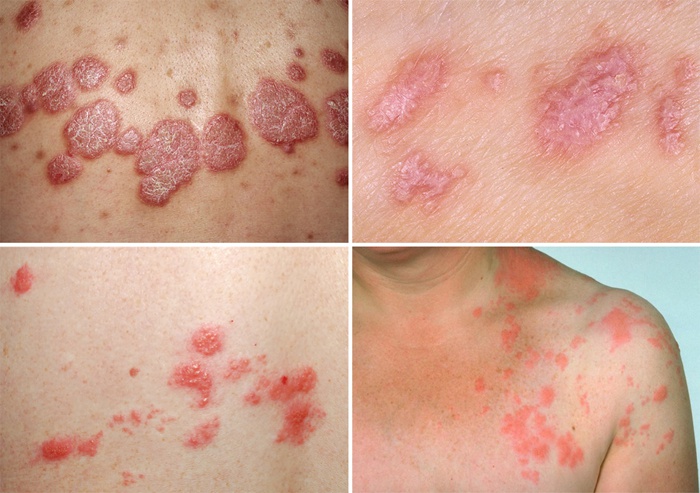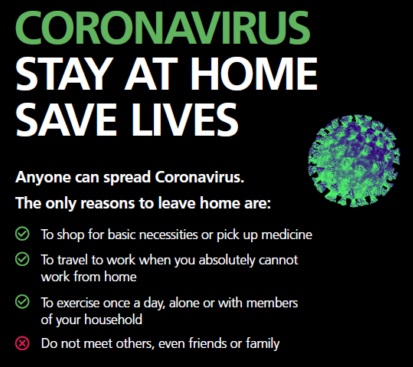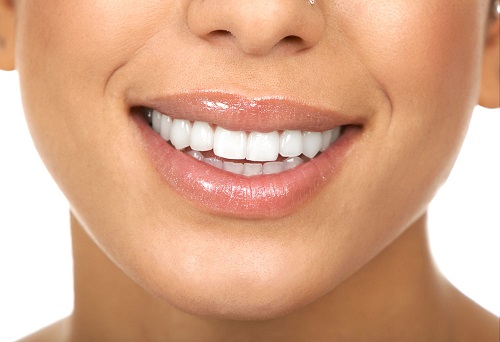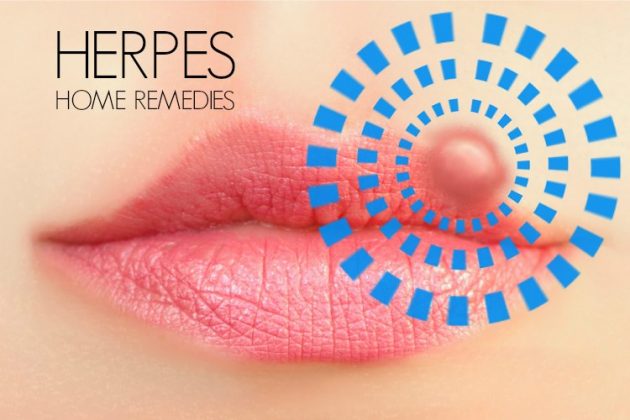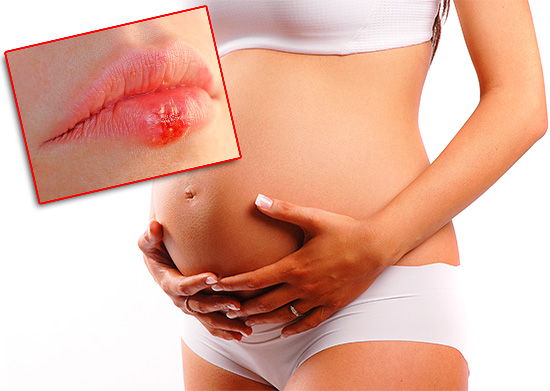Content
- First signs of lichen
- Varieties of lichen and their symptoms
- What does lichen look like in a person – photo
Lichen refers to skin diseases that occur very often. Unpleasant moment, agree? Inflamed foci or a small rash with a constant feeling of itching are not only discomfort, but also not too attractive appearance. Symptoms and types of lichen in humans are diverse. Classification allows you to recognize the type of disease as accurately as possible and apply effective treatment to eliminate itchy spots. What does lichen look like on the human body, what features of each species and what parts of the body are affected more often than others?
First signs of lichen
Types of lichen in humans are divided depending on the cause of the appearance: infectious (fungal) damage or non-infectious. The second type includes the appearance of lichen against the background of stress, allergic reactions, problems within the body or decreased immunity. Unlike an infectious disease, the disease caused by such problems is not contagious. The fungus and the virus can be easily transmitted to a person in contact with a diseased skin lichen.
Symptoms of lichen are diagnosed with the type of disease. An infectious disease specialist or a dermatologist will be more accurate in determining the type of the disease than anyone else, therefore, at the first suspicion, contact a specialist not to aggravate the situation. The disease lichen can drag on, so if during the treatment course the effectiveness of the funds is not observed for a long time – do not panic, but go for examination.
In adults
Depending on the type, lichen skin manifests itself in different ways. Common Symptoms:
- rash of spots;
- small red nodular rash;
- areas of rashes, with peeling and hair loss;
- a feeling of pain, burning on the inflamed foci;
- with a rash, pain in the ribs is observed;
- huge areas of affected skin of red or red-violet.
In children
Lichen in children begins with the appearance on the skin of pink spots with an irregular shape. It can be one spot or additional rashes join it. After some time, the rash from lichen increases and coalesces, forming huge affected areas. The most vulnerable parts of the body: hands, stomach, legs, head, neck (especially the area under the hair). The first spots after a few days begin to peel off, itch very much.
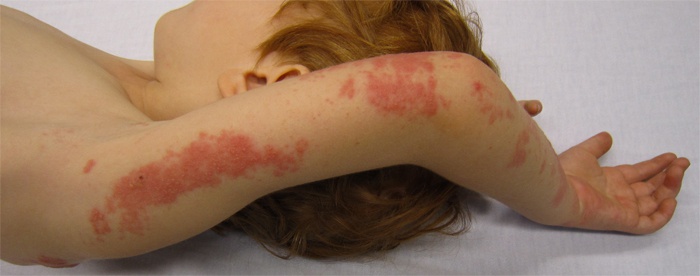
Sometimes lichen provokes an increase in temperature in a child, an increase in lymph nodes. The most common in childhood is ringworm. Having diagnosed this disease, the child is immediately isolated from the rest, visiting the school, kindergarten and playgrounds is prohibited. The child, after detecting symptoms of lichen, should be examined by a dermatologist or infectious disease specialist. Pets in contact with the child (cats, dogs) should also be checked to avoid re-infection..
Varieties of lichen and their symptoms
There is a classification that includes the main types of lichen in humans:
- pink;
- ringworm;
- flat red;
- girdle;
- pityriasis;
- tropical white and black;
- scrofulous;
- multi-colored;
- sunshine;
- lichen color.
Treatment is selected based on the variety of the disease, the symptoms and sensations of the patient. An important stage of the process, which determines the intensity of the course of therapy and the level of hazardous effects on the human body and others. The disease must be prevented as soon as possible, because lichen has the ability to spread rapidly and “decorate” the body with huge inflamed areas that merge into a single whole.
Tinea
Refers to viral species of human lichen. The causative agent causes the occurrence – a virus that provokes the appearance of chickenpox. A person who has already had chickenpox may be exposed to shingles. The virus is stored in the human body, significantly reducing immunity to all kinds of diseases. If a person has not had chickenpox, then a person with herpes zoster can be infected with chickenpox..
Symptoms of shingles in humans:
- temperature gradually rising to high elevations;
- chills;
- nausea;
- itching
- the appearance of small bubbles with a transparent fluid;
- asymmetric location of lesions;
- red background color depriving;
- bubbles after a couple of days burst and crust;
- vulnerable zone – gaps between the ribs;
- complications: eye damage and sharp visual impairment, up to blindness.
Pityriasis (multi-colored)
The upper skin is covered with multi-colored spots with noticeable peeling. The multi-colored type of the disease is more common among young people. Such lichen is contagious (caused by a fungus), but under certain conditions: disruption of the endocrine system, changes in skin acidity, high sweating, contact with injured skin of a healthy person. Temperature, intoxication in patients is not observed.
Symptoms of how lichen is manifested:
- spots on the neck and torso;
- characteristic spots: round in shape, with torn edges and different sizes, do not stand out above the level of the skin;
- sites do not peel;
- itching is not observed;
- gradually merge;
- spot color: yellow, brown, pink, brown, whitish (on tanned skin);
- pain in the patient is absent.
Pink
The main group of people who “catch” the disease is in the age group of 15-40 years. The development of the disease is most active in the autumn-spring period. Pink lichen is not contagious, this variety is more attributed to allergic manifestations. The main symptoms:
- a specific profuse rash with “maternal” (major) and “daughter” plaques;
- the color of the rash is pink, the borders of the plaques are clear and bright;
- fever of the human body;
- joint pain;
- weakness, change in heart rate;
- main areas of occurrence: stomach, back, hips, neck, lower and upper limbs, skin folds;
- spots increase with time, their central area turns yellow and peel off;
- sometimes the affected areas itch;
- after 2-3 weeks, lichen disappears.
Lichen planus
A chronic form of the disease that most often affects the female half of the planet. There are no thoroughly studied and confirmed reasons for the appearance of red lichen, but there is a possibility that this type develops when the metabolic mechanisms and the immune system are disturbed. Flat lichen appears on the skin, nails, mucous membranes. Does not have an inflammatory effect.
The main signs of this type of lichen:
- a rash of bright color (raspberry, red, scarlet, red with a purple tint);
- the shape of the rashes is irregular, the top layer is shiny;
- itchy sensations;
- sometimes the rash flakes;
- rash nodules are merged in areas;
- new rashes are located near the old;
- after treatment, spots remain on the skin;
- nails “decorate” grooves, strips, the plate is destroyed.
Ringworm
In order not to become infected with ringworm, it is necessary to observe mandatory hygiene: you can not use one comb, underwear, sponges and leather processing items. Sleeping with a sick person in the same bed is also fraught with infection. The easiest way to catch a ringworm is if you have reduced skin immunity in certain areas or do not regularly follow personal hygiene rules. Frequent carriers of lichen are children.
Features of the disease:
- pink spots with a white scaly center;
- severe itching in the affected areas;
- the appearance of spots on a certain part of the body is due to the contact of a fungal infection with healthy skin;
- hair breaks on the head, plaque appears after a couple of months, and the skin is covered with pustules.
Tubular
The fungus Malassesia affects the skin and lingers for a long time in the sebaceous glands, more precisely their ducts. Pipe lichen does not cause pain in a patient; it appears as soon as a drop in immunity and increased sweating are observed. How does lichen appear:
- small flaky spots;
- the edges of the plots are uneven;
- after some time, the areas merge into one spot of yellow, pink or brownish color;
- no itching.
Scaly
The popular name for this variety is psoriasis. Scaly lichen appears on the elbows, knees and other joints. This is a non-communicable disease and cannot be infected. This type of lichen appears equally in representatives of any gender, regardless of age category. Psoriasis is a chronic disease that manifests itself in individual conditions (nervous breakdowns, emotional shock, hormonal disruptions). The disease progresses slowly, may not give “news” about itself for years, and then suddenly flare up.
Thanks to modern medicine, medications (injections, dropper solutions, tablets) are used to treat psoriasis, which reduce and eliminate the manifestations of the disease, but not the disease itself. At the moment, the disease is recognized as incurable. Common symptoms of a scaly appearance in a person:
- redness on the skin of certain areas of different diameters;
- the appearance of specific formations with fluid in red skin areas;
- severe itching of foci;
- skin disorder: cracking, bleeding wounds.
Cracking of affected skin areas threatens to introduce various infections, therefore, in this condition, an urgent intensive course of treatment is needed. A person who had to deal with psoriasis needs to protect himself from stress, nervous conditions, strengthen his immune system and protect his skin from the effects of harmful substances. For women who have been attacked by lichen, it is worth paying attention to the means used, they should not provoke the appearance of ugly areas on the skin again.
What does lichen look like in a person – photo
Red large affected areas, a small rash of nodules with fluid, the main foci with additional formations nearby – all this is lichen. Depending on the variety, they differ:
- the shape of the spots (round, irregular);
- the edges of the plots (pronounced, asymmetric);
- color (yellow, red, white, pink, yellow, brown and purple shades);
- the center of the spot (red, white, scaly, with bubbles);
- structure of affected skin (scaly, smooth, bubbly);
- bulge spots.






